|
|
|
Sort Order |
|
|
|
Items / Page
|
|
|
|
|
|
|
| Srl | Item |
| 1 |
ID:
186592
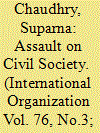

|
|
|
|
|
| Summary/Abstract |
Nongovernmental organizations are central to contemporary global governance, and their numbers and influence have grown dramatically since the middle of the twentieth century. However, in the last three decades more than 130 states have repressed these groups, suggesting that a broad range of states perceive them as costly. When they choose to repress NGOs, under what conditions do states use violent strategies versus administrative means? The choice depends on two main factors: the nature of the threat posed by these groups, and the consequences of cracking down on them. Violent crackdown is useful in the face of immediate domestic threats, such as protests. However, violence may increase the state's criminal liability, reduce its legitimacy, violate human rights treaties, and further intensify mobilization against the regime. Therefore, states are more likely to use administrative crackdown, especially in dealing with long-term threats, such as when NGOs influence electoral politics. I test this theory using an original data set of administrative crackdowns on NGOs, as well as violent crackdown on NGO activists, across all countries from 1990 to 2013. To shed light on the strategic decision between violent or administrative crackdown, and how states may perceive threats from domestic and international NGOs differently, I provide a case study from India. I conclude by discussing the implications of this crackdown for the use of civil society actors by the international community, as well as donors and citizens in the global South.
|
|
|
|
|
|
|
|
|
|
|
|
|
|
|
|
| 2 |
ID:
186596
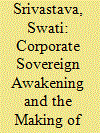

|
|
|
|
|
| Summary/Abstract |
The English East India Company's “company-state” lasted 274 years—longer than most states. This research note uses new archival evidence to study the Company as a catalyst in the development of modern state sovereignty. Drawing on the records of 16,740 managerial and shareholder meetings between 1678 and 1795, I find that as the Company grew through wars, its claim to sovereign authority shifted from a privilege delegated by Crown and Parliament to a self-possessed right. This “sovereign awakening” sparked a reckoning within the English state, which had thus far tolerated ambiguity in Company sovereignty based on the early modern shared international understanding of divisible, nonhierarchical layered sovereignty. But self-possessed nonstate sovereignty claimed from the core of the state became too much. State actors responded by anchoring sovereign authority along more hierarchical, indivisible foundations espoused by theorists centuries earlier. The new research makes two contributions. First, it introduces the conceptual dynamic of “war awakens sovereigns” (beyond making states) by entangling entities in peacemaking to defend sovereign claims. Second, it extends arguments about the European switch from layered sovereignty to hierarchical statist forms by situating the Company's sovereign evolution in this transformation. Ultimately, this study enables fuller historicization of both nonstate authority and the social construction of sovereignty in international politics.
|
|
|
|
|
|
|
|
|
|
|
|
|
|
|
|
| 3 |
ID:
186591
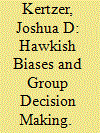

|
|
|
|
|
| Summary/Abstract |
How do cognitive biases relevant to foreign policy decision making aggregate in groups? Many tendencies identified in the behavioral decision-making literature—such as reactive devaluation, the intentionality bias, and risk seeking in the domain of losses—have been linked to hawkishness in foreign policy choices, potentially increasing the risk of conflict, but how these “hawkish biases” operate in the small-group contexts in which foreign policy decisions are often made is unknown. We field three large-scale group experiments to test how these biases aggregate in groups. We find that groups are just as susceptible as individuals to these canonical biases, with neither hierarchical nor horizontal group decision-making structures significantly attenuating the magnitude of bias. Moreover, diverse groups perform similarly to more homogeneous ones, exhibiting similar degrees of bias and marginally increased risk of dissension. These results suggest that at least with these types of biases, the “aggregation problem” may be less problematic for psychological theories in international relations than some critics have argued. This has important implications for understanding foreign policy decision making, the role of group processes, and the behavioral revolution in international relations.
|
|
|
|
|
|
|
|
|
|
|
|
|
|
|
|
| 4 |
ID:
186594


|
|
|
|
|
| Summary/Abstract |
Why has gold persisted as a significant reserve asset despite momentous changes in international monetary relations since the collapse of the classical gold standard? IPE theories have little to say about this question. Conventional accounts of international monetary relations depict a succession of discrete monetary regimes characterized by specific power structures or dominant ideas. To explain the continuous importance of gold, we draw on insights from social psychology and new materialist theories. We argue that international monetary relations should be understood as a complex assemblage of material artifacts, institutions, ideas, and practices. For much of its history, this assemblage revolved around the pivotal practice of referencing money to gold. The centrality of gold as experienced by policymakers had important effects. Using archival and other evidence, we document these effects from the 1944 Bretton Woods conference through the transition to floating exchange rates in the mid-1970s; most IPE scholars underestimate the role of gold during this period. Power relations and economic ideas were obviously important, but they contributed little to a fundamental development: the long process of reluctantly coming to terms with the limitations of specie-backed currency, and the progressive and still ongoing decentering of gold in international monetary relations.
|
|
|
|
|
|
|
|
|
|
|
|
|
|
|
|
| 5 |
ID:
186593
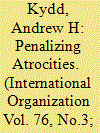

|
|
|
|
|
| Summary/Abstract |
The Syrian Civil War that began in 2011 killed more than 400,000 civilians. Could a limited intervention motivated by humanitarian concerns have reduced the death toll at an acceptable cost to the intervenors? I distinguish between two approaches to intervention: penalizing atrocities, by raising the cost and lowering the benefit of killing civilians; and fostering a balance of power, to convince the two sides that they cannot win on the battlefield and so must negotiate an end to the war. I show, using a game-theoretic model, that fostering a balance of power causes the government to commit more atrocities and prolongs the war. Penalizing atrocities, while it increases the likelihood of war, can reduce the expected level of atrocities. The model helps account for the failure of US efforts to promote negotiations by aiding Syrian rebels, and the success of efforts to deter Syrian chemical weapons use through threats and limited strikes.
|
|
|
|
|
|
|
|
|
|
|
|
|
|
|
|
| 6 |
ID:
186598
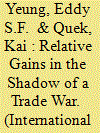

|
|
|
|
|
| Summary/Abstract |
When do people care about relative gains in trade? Much of the international relations scholarship—and much of the political rhetoric on trade—would lead us to expect support for a trade policy that benefits ourselves more than it benefits others. Yet, a large interdisciplinary literature also points to the prevalence and importance of other-regarding preferences, rendering the conventional wisdom contestable. We investigate whether and how relative gains influence trade preferences through an original survey experiment in the midst of the China–US trade war. We find that in a win-win scenario, relative gains shape trade opinion: if both sides are gaining, people want to gain more than their foreign trade partner. However, these considerations are offset in a win-lose scenario where the other side is losing out. Relative-gains considerations causally affect opinion on trade, but not in a “beggar-thy-neighbor” or even a “beggar-thy-rival” situation. These findings contribute to our understanding of the role of relative gains in international relations and provide the first experimental evidence that relative-gains considerations can be offset by other-regarding preferences in international trade.
|
|
|
|
|
|
|
|
|
|
|
|
|
|
|
|
| 7 |
ID:
186595


|
|
|
|
|
| Summary/Abstract |
A central theme in the study of international relations is that anarchy requires states to set aside moral concerns to attain security, rendering IR an autonomous sphere devoid of ethical considerations. Evolutionary and moral psychology, however, suggest that morality emerged to promote human success under such conditions. It is not despite anarchy but because of anarchy that humans have an ethical sense. Our argument has three empirical implications. First, it is almost impossible to talk about threat and harm without invoking morality. Second, state leaders and the public will use moral judgments as a basis, indeed the most important factor, for assessing international threat, just as research shows they do at the interpersonal level. Third, foreign policy driven by a conception of international relations as an amoral sphere will be quite rare. Word embeddings applied to large political and nonpolitical corpora, a survey experiment in Russia, and an in-depth analysis of Hitler's foreign policy thought suggest that individuals both condemn aggressive behavior by others and screen for threats on the basis of morality. The findings erode notions of IR as an autonomous sphere and upset traditional materialist–ideational dichotomies.
|
|
|
|
|
|
|
|
|
|
|
|
|
|
|
|
| 8 |
ID:
186597


|
|
|
|
|
| Summary/Abstract |
What determines public support for trade liberalization? Scholars of international political economy have generally focused on the effects of openness on employment via individuals’ skill level, sector, or occupation. Recent developments in trade economics suggest that the characteristics of individual citizens’ employing firms may also shape their attitudes on trade policy. In this paper, using under-explored survey data combining trade opinion with measures of employer productivity (from the 2008 Japanese General Social Survey), we present evidence that employees of more productive, more globalized firms are much more supportive of trade openness than employees of less productive, domestically oriented firms, even when accounting for skill level and sectoral and occupational characteristics. Moreover, we find evidence that the effects of these characteristics described in the literature are conditioned by globalized firm employment. Last, we find that the effect of globalized firm employment is conditioned by employees’ relative position within their firms. Those who are more likely to benefit directly from firm success—such as permanent employees and managers—hold the most pro-trade preferences. These findings suggest that economic interests affect individual policy preferences in more nuanced ways than previously recognized.
|
|
|
|
|
|
|
|
|
|
|
|
|
|
|
|
|
|
|
|
|